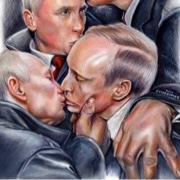|
citations in original https://www.jacobinmag.com/2015/07/hillary-libya-nato-qaddafi-obama/ quote:Worse Than Benghazi
|
|
|
|

|
| # ? Apr 23, 2024 21:39 |
|
I'm reading a lot of "Why didn't America just fix Libya?"
|
|
|
|
America didn't have to fix Libya. It just had to not help the rebels, who would have lost fairly early on without American intervention.
|
|
|
|
if libya have gun this not happen
|
|
|
|
If it was a legitimate revolution, the country has a way of shutting that whole thing down.
|
|
|
|
I see no one has mentioned how Libya had the best HDI in Africa and was supported by noted Socialist Hugo Chavez.
|
|
|
|
Eh, official Libya thread, sure why not. Broadly, the Libyan intervention was the right decision. There were definitely fuckups, and the US could have assisted Libya more in the reconstruction. But Libya right now has two governments that are at least attempting to reach a unity government. Strudel Man posted:America didn't have to fix Libya. It just had to not help the rebels, who would have lost fairly early on without American intervention.
|
|
|
|
fade5 posted:Alternatively, a second Syria happens.
|
|
|
|
It's also very possible Hillary deliberately went in there to bomb brown people to pad our her resume for her candidacy.
|
|
|
|
Hopefully Libya melts down either before she wins the primary or after she wins the election otherwise the dems might actually get stumped by trump.
|
|
|
|
Strudel Man posted:America didn't have to fix Libya. It just had to not help the rebels, who would have lost fairly early on without American intervention. Right, that would been a great outcome. I don't know, I'm not saying the situation in Libya is anything other than terrible, but I also don't think any Libyans are wishing Gaddafi was still around.
|
|
|
|
I think Libya is kinda messed up but I don't think we're going to see ISIS taking over or Gaddafi 2.0, at least not before the end of the election. It's not going to get much better but it's not going to get that bad.
|
|
|
|
Xandu posted:Right, that would been a great outcome.
|
|
|
|
DrProsek posted:I think Libya is kinda messed up but I don't think we're going to see ISIS taking over or Gaddafi 2.0, at least not before the end of the election. It's not going to get much better but it's not going to get that bad. To be clear, ISIS has taken a considerable number of the oil ports and is fighting for strategic control over a couple cities. They aren't exactly a non-factor, and also Libya is going to run out of money within 2 years. I guess having ISIS control about half of your economic output is "kinda messed up."
|
|
|
|
Strudel Man posted:Really? I would honestly expect that to be a fairly common sentiment at this point, all things considered. I've done some research (unpublished so I hate to even bring it up) amongst Libyans, they're certainly not happy with status quo, but there's not a widespread desire to go back to how things were. I couldn't tell you exactly why, but it seems like people now still have some hope that one day things will get better, even if they're poo poo now. And that optimism didn't exist at all under Gaddafi. Xandu fucked around with this message at 23:38 on Oct 23, 2015 |
|
|
|
Considering what precipitated intervention was Ghaddafi marching an army on Benghazi promising a house-by-house extermination of the "cockroaches," I get the feeling that in an alternate universe bizarro Tezzor is using US non-intervention in the face of a massacre as evidence of hypocrisy.
|
|
|
|
It does seem like the us has tried ever intervention strategy in MENA over the past 15 years, from full scale occupation to non-intervention to aerial support/nfz to covert arms supplying and they've all been a pretty clear failure.
|
|
|
|
Aw poo poo, Benghazi, Tezzor and jacobinmag.com in one thread? Can we toss some Israel/Palestine or gun control on top? I'm almost there
|
|
|
|
Xandu posted:I've done some research (unpublished so I hate to even bring it up) amongst Libyans, they're certainly not happy with status quo, but there's not a widespread desire to go back to how things were. I couldn't tell you exactly why, but it seems like people now still have some hope that one day things will get better, even if they're poo poo now. And that optimism didn't exist at all under Gaddafi.
|
|
|
|
http://www.bloomberg.com/news/articles/2015-10-22/unity-but-not-for-long-as-libya-s-feuding-factions-sink-accordquote:Unity, But Not for Long, as Libya's Feuding Factions Sink Accord It doesn't look like the peace deal is going to work out.
|
|
|
|
Why didn't America just do the thing that would have worked, though? America is either stupid or evil. Pick one.
|
|
|
|
Arglebargle III posted:Why didn't America just do the thing that would have worked, though? America is either stupid or evil. Pick one. Hey, America can do both don't underestimate us.
|
|
|
|
The USSR was totally justified in its treatment of the Polish Armia Krajowa, so as to prevent Poland from disintegrating into civil war. Discuss.
|
|
|
|
|
Effectronica posted:The USSR was totally justified in its treatment of the Polish Armia Krajowa, so as to prevent Poland from disintegrating into civil war. Discuss. agreed but unironically
|
|
|
|
Effectronica posted:The USSR was totally justified in its treatment of the Polish Armia Krajowa, so as to prevent Poland from disintegrating into civil war. Discuss. I liked the part where the heroes of the revolution crushed that Hungarian student revolt with tanks. It's too bad the capitalists beat the Soviets eventually, truly a loss for this world. 
|
|
|
|
I will give myself 15 minutes to free associate about Lybia (but I can use my notes): It's ludicrous that Ghaddafi lasted as long as he did. It's no surprise Berlusconi and Ghaddafi became such good friends- they are the same sort of man. Ghaddafi never solved his problem with Islam. From the beginning he had unenviable challenge of proving his islamic credentials while undermining Sanusi's. Ghaddafi had to deal with: Rural Sanusi supporters, particularly in Cyrenaica educated urbanites in tripoli and benghazi, professionals who were part of the Ikhwan (Muslim Brotherhood) He did this by: Regulating zawiyas (the sufi lodges, not the schools) Nationalized waqf (property controlled by ulema) and prohibited public rulings on political matters by religious bodies (1975) Touting the centrality of Islam to the republic, and developing his alternative Islam, as articulated in the Green Book and later in speeches and texts during his 1978 “Islamic revolution.” Basically, he tried to copy what his hero Nasser had successfully done- but of course Nassar only had to keep it going for a decade. By the late 70's the ulema was attacking the Green Book as incompatible with Islam. In 1978 he launched his “Islamic Revolution” with a state-sactioned notion of Islam that was completely his own, rejecting the sunnah, the hadith, iijma- you only need the Quran and your innate ability to reason. Islam was like Jazz to him. The highest religious authority in Libya, sheikh Tahir Al-Zawi resigned in protest and subsequently put under house arrest. Tripoli preacher and modernizer Sheik Mohamed Abdelsalam Al-Bishti got “disappeared.” 1978 was the same year Musa Al-Sadr, “disappeared” in Libya. I've always assumed Ghaddafi got into an argument with him and killed him like that bar scene in Goodfellas. The Libyan embassy in Beiruit gets bombed over this. 1984 2 students hung on the campus of Al-Fateh university.I don't know what else was going on 1980-85 Islamic groups were always more threatening to Ghaddafi than liberals, because the existence of informed Islam undermined the legitimacy of his bidaa Islam. It's why when oil prices collapsed: https://en.wikipedia.org/wiki/1980s_oil_gluthe had a round of political and economic liberalization, but he couldn't relinquish any control over religious institutions. 1989 student riots at al fateh Once UN sanctions take effect, things become desperate in the 90's. The Islamist revolutionary groups just in the nineties were: Al-Jama'a Al-Islamiyya Al-Muqatila Al-Jama'a Al-Islamiyya Al-Libiyaa Harakat Al-Shuhada Al-Islamiyya Ansar Allah Harakat Al-Wataniyyin Al-Libiyyin I may be forgetting some 1994 Ghaddafi banned alcohol and changed the Latin to the Islamic calender- because Ghaddafi is such a devout Muslim everyone, really. In contravention of UN sanctions, in 1997 he had a libyan aircraft fly directly to Saudi Arabia with hand-picked pilgrims to perform the hajj, even though he himself had been saying the Hajj is optional since the late 70's. The Ghaddafi's relative economic success saved him over and over- but you can't just improvise your countrie's religion and not expect that to catch up with you. Ghaddafi was more compliant with the West's demands- more economically enmeshed than ever, but the west decided he would go. He was weak, and nobody likes to back a loser. Libya never recognized Israel (even though Ghaddafi kind of did personally). Ghaddafi was always explicitly anti-western, even though his social and economic programs were infact very western looking, and he was continuously searching for ways to safely appease Europe, if only so he could misbehave more in the future (remember when Joseph Nye Jr, Francis Fukuyama, and Robert Putnam were hired to meet personally with Ghaddafi? They would rather you didn't). In summary: Ghaddafi's aged very poorly: a 7 out of 10. Dilkington fucked around with this message at 05:32 on Oct 24, 2015 |
|
|
|
DeusExMachinima posted:I liked the part where the heroes of the revolution crushed that Hungarian student revolt with tanks. It's too bad the capitalists beat the Soviets eventually, truly a loss for this world. What's even more tragic to me is the fate of all those Red Army heroes of the Russian civil war. Consider this: Being a member of the generation which fought in the revolution had great political advantages- many officers that had so bravely fought against the Whites now had positions in the party- many in 1934 would have attended the 17th Congress of the All-Union Communist Party (Victor's Congress). There were 1,996 party members present. By 1938, 1,108 of them had been arrested by the NKVD, and of those 848 were executed.  (Moshe Lewin's The Soviet Century) (Moshe Lewin's The Soviet Century)Now consider the men who weren't officers: by Operation Barbarossa, most of the rank and file would have been too old to have been part of the standing army (atleast at first). But the NCOs, battle tested veterans of the civil war, they would have been stationed on the Eastern Front. That means most them were likely among the millions of soldiers captured in the early German encirclements. The best, most noble soldiers Russia ever created probably did not die in combat against the fascists, but more likely starved to death in enormous barbwire pens. Stalin ignored the countless warnings he received about Operation Barbarossa- deliveries of raw materials (negotiated during the Ribbontrop-Molotov pact) were still departing for Germany only hours before Operation Barbarossa commenced. It also did not help that most of the officer corps was purged just before the war. 
Dilkington fucked around with this message at 06:05 on Oct 24, 2015 |
|
|
|
my favorite war is actually the war of jenkins ear, tezzor
|
|
|
|
There was something like a 5-10 year period, before Stalin took over, where the Soviet Union could have turned out well. It didn't. 
|
|
|
|
jacobin is counter-revolutionary liberal trash why you postin that crap here
|
|
|
|
MonsieurChoc posted:There was something like a 5-10 year period, before Stalin took over, where the Soviet Union could have turned out well. No one says that the US wouldn't have failed if John Adams hadn't become a dictator and dissolved the republic, because it didn't happen, because our system of government never allowed things to get that point despite the non-democratic tendencies of the Adams administration. I feel like this common argument that country X would have been better if person Y had been in power instead seems lazy and relies too much on Great Man theories. History appears to show that revolutions almost naturally lead to dictatorships most of the time, even when those revolutions were borne out of democratic principles (English Civil War, French Revolution, Chinese Civil War, Russian Revolution, etc.)
|
|
|
|
A revolution is major social upheaval so the country will almost certainly revert to the lowest level of governance at first. Dictatorship is the floor, and when you break a system it will take time to build a new one to take it's place.
|
|
|
|
LookingGodIntheEye posted:I think this trope that the failure of the USSR supposedly seemed to hinge so desperately on singular individuals like Lenin, Trotsky, and Stalin indicates some fundamental instability and problem that existed with the USSR itself. The problem is in Russia, the only literal options were some time of dictatorship, yes even including the provisional republic. It wasn't a question if there was going to be a dictatorship but simply what type. There was never any inkling of democracy in Russia, not then, not the 1990s and not today.
|
|
|
|
LookingGodIntheEye posted:I think this trope that the failure of the USSR supposedly seemed to hinge so desperately on singular individuals like Lenin, Trotsky, and Stalin indicates some fundamental instability and problem that existed with the USSR itself. That wasn't what I said though: there was a period of time in the early 20s were things were starting to look up for the Soviet Union. How and why it went bad is a very complex question, and I'm nowhere near an expert. And even if Stalin's reign ends up ultimately to blam, Stalin isn't the sole responsible person for his regime: a ton fo factors and people helped in various ways to make it happen. I don't believe in Great Man History.
|
|
|
|
Tezzor posted:citations in original You've got a point, and so did this guy. https://www.youtube.com/watch?v=U1WV-k2Mzgk
|
|
|
|
i support our neoliberal overlords in their endeavors and look forwards to more third worlders being bombed to make way for capitalism
|
|
|
MonsieurChoc posted:There was something like a 5-10 year period, before Stalin took over, where the Soviet Union could have turned out well. Nah. Stalin's viler policies were adopted from Trotsky, Bukharin's idea of continuing the NEP would have left the USSR hideously vulnerable- even if we allow for Hitler's incredible leap to power to fail, as it probably would, statistically, the Japanese planned to invade anyways. Furthermore, without some kind of capital concentration and accumulation scheme that was both workable and acceptable to the Bolsheviks of 1924 or so, the USSR would remain an agrarian country and get squeezed into abandoning any efforts towards socialism if it opened up.
|
|
|
|
|
Effectronica posted:Nah. Stalin's viler policies were adopted from Trotsky, Bukharin's idea of continuing the NEP would have left the USSR hideously vulnerable- even if we allow for Hitler's incredible leap to power to fail, as it probably would, statistically, the Japanese planned to invade anyways. Yeah, I don't know if I would blame Trotsky for crash collectivization (and the resulting famine), the Great Purge, the Finnish War, or being asleep at the switch in June 41. Under Trotsky it would still be an authoritarian state if not totalitarian but Stalin had his own special magic. Also, there was increasing acknowledgement even before Stalin took power of the limits of the NEP, and the price scissor was out in the open. It was clear crash industrialization needed to happen. That said, the question is about how you were going to go about it, and Stalin really tested of the limits of getting it done. Oh, and the Soviets started designing their own tanks in 1924. They could held the Japanese, probably not the Nazis though.
|
|
|
|
Nelson Mandingo posted:I'm reading a lot of "Why didn't America just fix Libya?" Libya was one of the main collaborateurs in keeping African migrants away from European shores. By destabilizing Libya, America has removed an impedent to migration into the European Union, putting economic and political strain on the EU member states. This is advantageous to American interests, because it further keeps the European Union from trying to become an established power in its own right, that might eventually threaten the economic and political hegemony of the United States of America. (
|
|
|
|

|
| # ? Apr 23, 2024 21:39 |
Ardennes posted:Yeah, I don't know if I would blame Trotsky for crash collectivization (and the resulting famine), the Great Purge, the Finnish War, or being asleep at the switch in June 41. Under Trotsky it would still be an authoritarian state if not totalitarian but Stalin had his own special magic. Collectivization was Trotsky's idea. He actually wanted to implement it immediately, where Stalin waited. Dekulakization was also Trotsky's idea. The invisible famine Stalin induced in the cities to bring women into the workforce? Also exactly in line with Trotsky's planned policies. The Finnish Winter War was fought to secure the security of Leningrad and the northern USSR. Stalin attempting to put in a puppet government is something a lot of Bolsheviks would probably have done, especially internationalists like Trotsky. The purges, I think, are less on Stalin's personal paranoia and more on the basic issue that a substantial part of the Red Army's officer corps were politically suspicious at a time when it was apparent the USSR would be facing invasions shortly. Particular targets like Tukhachevsky or Rokossovsky can be attributed to Stalin's personal desires, probably, but don't forget that none of the Politburo ever objected. Almost all the denunciations later came from people on the lower rungs of power.
|
|
|
|








 This poster loves police brutality, but only when its against minorities!
This poster loves police brutality, but only when its against minorities!























